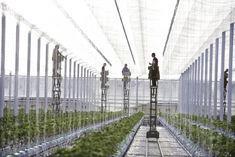
The ground-breaking UK greenhouse complex, Thanet Earth, has had its very low carbon status confirmed just weeks after half a million tomato and pepper plants settled in its greenhouses.
The independent assessment, carried out by consultants Bidwells Agribusiness, reports that the site near Birchington, East Kent qualified for the very low carbon status as set out by the British Standards Institute and the Carbon Trust in 2008.
The site’s three greenhouses are now complete along with seven vast reservoirs, a power generation plant able to supply electricity to 50,000 homes and substantial support infrastructure including an on-site packing facility occupying the 91-hectare former cauliflower farm just over a year since work began.
The project has deliberately set out to follow a Dutch low-carbon model using techniques such as growing without lights and using combined heat and power (CHP).
Judy Whittaker, communications manager at Fresca Group who are behind the project in conjunction with three growers, said of the report: “We are very pleased indeed. It confirms what we had hoped for and believed. The infrastructure model is really the only way we could have built this development for it to have made commercial and environmental sense. All of our growers have links to the Netherlands and we are waiting to see the results of Dutch trials going on at the moment to become even more carbon efficient.”
The site currently contains three glasshouses, the largest of which is almost ten hectares in size used by Rainbow Growers, Kaaij Redstar and A&A Growers.
Thanet Earth’s fledgling crops of tomatoes and peppers were planted shortly before Christmas with cucumbers due to join them and are set to be ready for consumption in March and April.
On the greenhouses’ rapid growth, each of them being built in around six months, Whittaker told freshinfo: “It was amazing to see the construction process. They’re like enormous kits of Mechano with very little concrete used, meaning they don’t alter the intrinsic nature of the land.”
“We will expand further to reach the full extent of the planned development. The next phase is to complete all seven planned greenhouses. We are hoping to have the rest of the site in production by the end of 2010.”
Bidwell’s report also detailed some possible developments the site could make in its sustainable low-carbon campaign including using LED glasshouse lights, growing higher-yielding varieties a proportion of renewable energy sources - wind, biomass and energy from waste to power CHP though this is unviable for the whole site commercially as energy sources stand and improving transport efficiency.
The report praised Thanet Earth in its low-carbon mission citing its considerable greenhouse gas savings compared to Spain and northern Europe.



